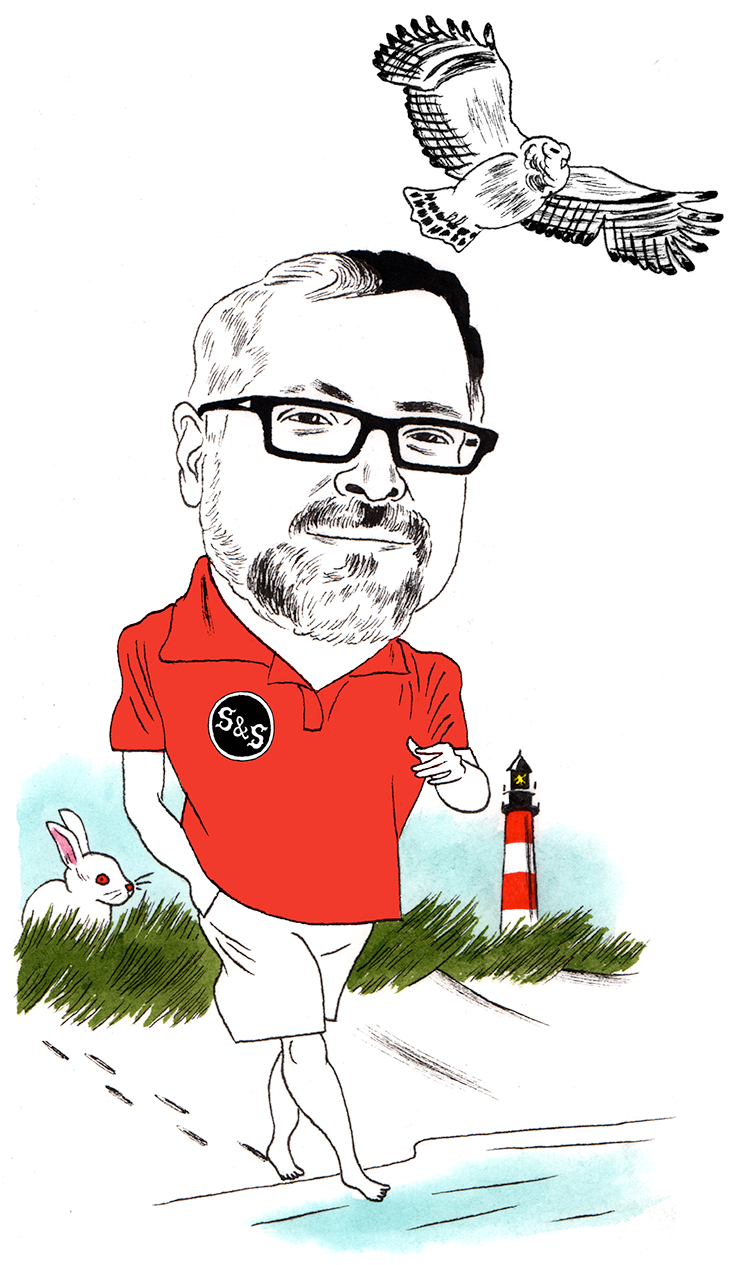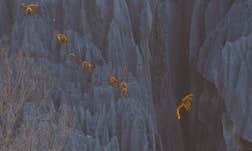In Jeff VanderMeer’s best-selling series Area X: The Southern Reach Trilogy, an unknown force infiltrates a coastal village and begins to transform the nature of everything living in a domain called Area X. A government-backed scientific research group, the Southern Reach, sets up at the border of the disturbance to research its mysterious cause and effects. Gradually the invisible force in Area X unravels and alters the Southern Reach scientists.
With smart, poetic prose, VanderMeer plants readers in a natural world that breathes. We are entranced by the colors of a ripple on the ocean water, as the characters are hypnotized by the sense of foreignness in the familiar landscape around them. VanderMeer uses color to ground the trilogy; shifting hues denote morphing environments in Area X. The threat is not (always) a monster with big teeth but the realization that something truly unknown is creeping into our senses.
VanderMeer is an award-winning author of numerous novels, essays, and non-fiction books, including Wonderbook: The Illustrated Guide to Creating Imaginative Fiction. The three books in The Southern Reach Trilogy—Annihilation, Authority, Acceptance—were released in succession in 2014. Recently, VanderMeer took a break from teaching a workshop at Yale to speak with Nautilus about fiction, physics, and the foundation of color in his stories.
How do you use color in your novels?
My mom is a painter, so color in scenes is very important to me. I don’t necessarily talk about it in a scientific way, but I do manipulate moods quite a bit by use of color. For Southern Reach, I actually had a book for every possible word for green, every possible word for blue, trying to use the unobtrusive ones, to describe the coast. I wanted to get across the feeling you have when the sun hits the water at a certain angle, and I didn’t want it to sound repetitious. I wanted to get across the beauty of the natural landscape in a way that wasn’t clichéd. A lot of that was deploying color and how it reacts in shadow and light.
I feel color somehow shapes the tension in Area X.
Well, I try to do that. Every time there’s a velvet ant in the books, for instance, it’s a sign that Area X is very close. I think velvet ants appear six times in Authority, and each and every time the color is a tip off that something is happening that shouldn’t be happening. In my previous books, which had a lot to do with fungal technology, I also experimented with color. I tried to use color to describe senses that are not the five senses we have. I was trying to convey an alien experience. And that’s kind of an impossible thing to do!
I have a view of science where you’re supposed to be able to fall on your face to some degree.
How important is getting the science right in your fiction?
I’m a little cynical about this because I grew up with a scientist dad. I have so much respect for him because he’s the kind of scientist who never had to retract a single paper, never had to retract a single finding, because he was so incredibly committed to being thorough and not cutting any corners. But I also saw him exist within an environment of absurdity, and reaching illogical conclusions within the scientific community. I realized early on that scientists are people like anyone else. Part of Authority is a send-up not of empirical science, but the science world of biases and pressures that scientists have to go through. The scientific method gets warped. Things get out of whack. So I have a view of science where you’re supposed to be able to fall on your face to some degree. You see a lot of great leaps occurred because people were willing to look stupid or “out there.”
How did where you grew up influence your writing?
I grew up in Fiji, where my dad was an entomologist studying rhinoceros beetles. We would go by boat to islands for him to conduct his research, and my mom would do biological illustrations of sea turtles. Then we moved to north Florida where there’s less heavy rainfall, and you have humidity every day and the mold and fungus that come with it. You don’t really have the ocean breezes, you have a situation that you’re seeing decay every single day in front of you to the point where you don’t even notice it. There’s these little shrimp-like creatures—not sea life—that come wriggling out of puddles in the driveway, microcosms of freshwater tidal pools. There’s nothing in this humid climate that is not full of life and at the same time decaying and dying. That had a huge impact on my fiction because it became subconscious, this overheated hothouse of humid decay.
I tried to use color to describe senses that are not the five senses we have. I was trying to convey an alien experience.
I have to say there is a haunted, deathly quality to your work.
My earliest memories are associated with death because I remember looking at a parrot fish that had been speared and brought out on the sand, and its eye was glassy. I remember vividly, even though I was only 6 or 7, the difference between the thing when it lived in its environment in water, and then when it was beached. I think that’s where a lot of that comes from.
Readers and critics always talk about the sense of something unknowable in the heart of your books. How do you get that in there?
If you’re talking about something in speculative fiction, and you’re thinking about something that’s unknowable, and trying to find connections between them, you become aware of inexplicable facts. I found it really fascinating to read that ocean waves and certain black holes may have similar structures. That begins to suggest connections that we don’t know about yet. So emphasizing that in the text, or having that little subtle subtext, influences the readers. It’s meant to show there’s a synergy between things. Though you don’t necessarily have to know why there’s a synergy.
Do you read about physics for research?
I do. And the way we see physics today in general is very reassuring and calming to me. When I started The Southern Reach, my fear was that anything that I might posit would be out of date, or seen as too out there, and yet every time I look at new stuff on dark matter, on different aspects of physics, I find they are just getting more surreal. Which I like because it ties into my own view of the absurdity of the universe. When we look closely at the universe, things we don’t know peek through. I think of dark matter as this unknowable thing, peeking through, and I see the characters in Southern Reach residing somewhere in that realm.
At the same time, the term dark matter begins to hint at a kind of antagonist. You wonder what’s behind something and my characters’ paranoia is the feeling there’s something underneath. So reading about the theoretical aspect of physics helped me create a tense sense of the unknowable, which is very dangerous to do in fiction because people want linear plots. They want closure of a certain kind, and they can get a little testy if you don’t deliver it. So I kept thinking of these things peeking out, and that the answer lay somewhere in the physics we don’t have yet.



























